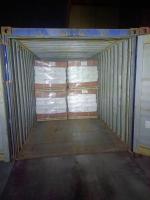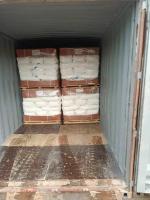Our Products
Polyacrylamide / Anionic flocculant of magnafloc 155 can be replaced by Chinafloc A2015

Anionic flocculants are water-soluble polymers that carry a negative charge and are primarily used to facilitate the agglomeration of particles in water treatment processes. These polymers play an important role in a wide range of industrial applications, including water purification, mining, wastewater treatment, oil and gas extraction, and many other sectors where the separation of solids from liquids is required. The main applications of anionic flocculants can be grouped into several broad categories, each serving a specific purpose based on the unique properties of the flocculants. This detailed exploration will discuss the diverse applications of anionic flocculants, their working mechanisms, and their significance in modern industrial processes.
1. Water and Wastewater Treatment
One of the primary applications of anionic flocculants is in water and wastewater treatment. In both municipal and industrial water treatment processes, anionic flocculants are used to remove suspended solids, organic material, and pollutants from water. The process typically involves the addition of flocculants to water, where they neutralize the electrical charges on suspended particles, leading to the formation of flocs or aggregates. These flocs can then be easily removed by sedimentation or filtration.
Municipal Water Treatment:
In municipal water treatment plants, anionic flocculants are used to treat drinking water and to remove impurities such as dirt, sand, organic matter, and microorganisms. They are particularly useful in coagulation and flocculation stages, where the goal is to aggregate fine particles and remove them through sedimentation or filtration. Anionic flocculants help in improving the efficiency of the coagulation process, especially in water that has high turbidity or contains a variety of suspended solids.
Industrial Wastewater Treatment:
In industrial sectors such as textiles, food processing, pharmaceuticals, and chemicals, wastewater treatment is critical for ensuring that effluent discharged into the environment meets regulatory standards. Anionic flocculants are often used to treat wastewater from these industries, where the water is typically loaded with oil, fats, chemicals, or other contaminants. Anionic flocculants help to bind suspended pollutants and promote their removal from the water. This is particularly important in industries that produce high volumes of wastewater containing fine, dispersed particles that need to be efficiently removed.
Mining Wastewater Treatment:
Mining operations generate large amounts of wastewater, often containing fine particulate matter and toxic chemicals. Anionic flocculants are used in the mining industry to treat process water, tailings, and effluent by aiding in the removal of suspended particles, heavy metals, and other pollutants. The flocculation process helps in the recovery of valuable minerals and the safe disposal of tailings, minimizing the environmental impact of mining activities.
2. Oil and Gas Industry
Anionic flocculants also find wide application in the oil and gas industry, particularly in the drilling and production stages. In this sector, flocculants are used to treat drilling muds, control the viscosity of drilling fluids, and help separate solids from liquids. The use of anionic flocculants helps in increasing the efficiency of the drilling process and reducing the environmental impact of waste disposal.
Drilling Waste Treatment:
During the drilling of oil and gas wells, large amounts of drilling fluid (also known as drilling mud) are used. These fluids can become contaminated with fine solids, cuttings, and other particles. Anionic flocculants are added to drilling muds to promote the agglomeration of solids, making it easier to separate them from the fluid. This process helps in reducing the volume of waste generated and ensures that the waste can be safely disposed of or reused in the drilling process.
Produced Water Treatment:
Produced water is a byproduct of oil and gas extraction, and it typically contains a mixture of oil, water, and solids. Anionic flocculants are used to treat produced water by binding suspended particles and facilitating their removal. This helps in reducing the environmental impact of oil and gas production, as the treated water can be safely discharged or reused in other processes.
3. Mining Industry
The mining industry also relies on anionic flocculants for various processes, particularly for the treatment of process water and tailings management. Mining activities often generate large volumes of wastewater that contain a high concentration of suspended solids, heavy metals, and chemicals. Anionic flocculants are used to improve the efficiency of sedimentation and filtration processes, facilitating the removal of fine particles and pollutants from the water.
Ore Processing:
Anionic flocculants are employed in the flotation process in mineral processing plants. In this context, flocculants aid in the aggregation of minerals and other particles, improving the recovery of valuable minerals while reducing the loss of fine material to tailings. The flocculation process also helps in the dewatering of tailings, which is an essential step for reducing the environmental impact of mining operations.
Tailings Management:
Tailings are the waste materials left over after the extraction of valuable minerals. Anionic flocculants are used to improve the dewatering of tailings, reducing the volume of waste that needs to be stored or disposed of. This is especially important in ensuring that tailings ponds are managed in an environmentally responsible manner, reducing the risk of contamination of surrounding ecosystems.
4. Paper and Pulp Industry
In the paper and pulp industry, anionic flocculants play a critical role in the treatment of wastewater and the improvement of papermaking processes. During the production of paper, large volumes of water are used, and this water often contains suspended fibers, fines, and other organic material. Anionic flocculants help to remove these impurities by aggregating the suspended particles, which can then be easily removed through sedimentation or filtration.
Papermaking Wastewater Treatment:
Anionic flocculants are used in the treatment of wastewater generated during the papermaking process. These flocculants help in the removal of suspended fibers, organic matter, and other contaminants, ensuring that the water can be recycled or safely discharged into the environment. By improving the efficiency of wastewater treatment, flocculants help to reduce the overall water consumption in papermaking and improve sustainability in the industry.
Retention and Drainage Aid in Papermaking:
In addition to wastewater treatment, anionic flocculants are also used in papermaking to improve retention and drainage. By promoting the aggregation of fine fibers and other suspended materials, flocculants help to increase the retention of fillers and fibers in the paper pulp. This improves the quality of the final paper product while also enhancing the efficiency of the papermaking process.
5. Agriculture and Soil Erosion Control
Anionic flocculants are sometimes used in agricultural applications, particularly in soil erosion control and irrigation water management. The use of flocculants in agriculture helps to improve the quality of irrigation water by removing suspended solids and pollutants. This is particularly important in regions where water scarcity is an issue, as it ensures that water resources are used efficiently.
Soil Erosion Control:
In areas prone to soil erosion, anionic flocculants can be applied to improve the stability of soil aggregates. When applied to water used for irrigation or land reclamation, flocculants can help to stabilize soil particles and prevent erosion. This is particularly beneficial in agricultural areas where soil degradation is a major concern.
6. Food and Beverage Industry
In the food and beverage industry, anionic flocculants are used for the clarification of liquids, including fruit juices, wines, and soft drinks. They help in removing suspended particles, colloids, and impurities from these liquids, improving their clarity and quality. Flocculants can be particularly useful in the production of beverages where the removal of fine particles is necessary for achieving the desired product characteristics.
Conclusion
Anionic flocculants are versatile and widely used in a variety of industries, ranging from water and wastewater treatment to mining, oil and gas, papermaking, and agriculture. Their ability to aggregate fine particles and promote the efficient removal of solids makes them invaluable in many processes that require solid-liquid separation. As industries continue to face challenges related to water treatment, environmental sustainability, and waste management, the role of anionic flocculants is likely to expand, contributing to more efficient, cost-effective, and environmentally friendly industrial practices.




805_small.jpg)
